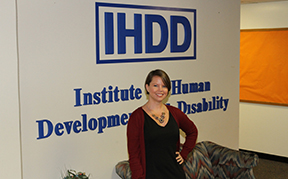UGA to Launch Inclusive, Post-secondary education program in 2017 (GA UCEDD)
November 30, 2015

|
Students with intellectual or developmental disabilities will soon be able to enjoy the full UGA experience with the launching of a new inclusive, post-secondary education program, Destination Dawgs, beginning in spring 2017.
The program, housed within the College of Family and Consumer Sciences' Institute on Human Development and Disability, aims to assist those students' transition into adulthood by fully immersing them in UGA life.
Destination Dawgs, still in development, aspires to have students reside in on-campus housing, audit classes and be supported by peer mentors who will assist them in their courses and on campus to improve their independent living skills.
"The goal is for Destination Dawgs participants to come out of the program with a platform for getting a good job and for leading a good adult life," said Carol Britton Laws, an assistant clinical professor and coordinator of UGA's Disability Studies Certificate program within IHDD. "The unemployment rate for people with disabilities nationally is about 75 percent, and we're trying to help students build skills and gain experiences that are marketable."
Laws envisions a five-semester model with a small cohort of five students enrolling in the program in spring 2017.
Because students won't enter the program through the regular admissions process, they will receive a certificate of completion rather than a degree.
The emphasis on developing and expanding post-secondary education opportunities in the state can be traced back to the founding of the Georgia Inclusive Postsecondary Education Consortium in 2011, which seeks to create opportunities for students who historically have not had access to postsecondary educational opportunities. The consortium is partly funded by the Georgia Council on Developmental Disabilities.
Currently in Georgia, four colleges offer inclusive post-secondary education (IPSE) programs: Kennesaw State University, Georgia Tech, Columbus State University and East Georgia State College.
Others are planned, including at Georgia State, Georgia Southern and Albany Technical College.
Over the past two years, the UGA J.W. Fanning Institute for Leadership Development conducted a feasibility study on IPSE at UGA, which built the capacity for the program to be developed and created support for it on campus.
The program also has received steady support from the leadership of the Student Government Association and UGA students in general, Laws said.
"What's changing is that the students we have here now are what we call the ADA generation," she said. "They're the first generation of Americans born after the passage of the Americans with Disabilities Act in 1990, and due to that and other legislation, they grew up with peers with intellectual differences in their classrooms to a greater extent than any of us did."
Acknowledging disability is really about understanding diversity, Laws said.
"Disability is just one characteristic that is possible in human beings, but it is often a characteristic that is used to discriminate against a person or to limit their opportunities," Laws said. "FACS has created a plan to increase the diversity of students within the college and this program will fit with that."
Peer mentors will receive training for the program beginning in fall 2016, covering several areas such as academics, health and wellness and social mentoring. The program also likely will include partnerships with vocational schools and job placement agencies.
"We're being careful about how it's being developed so we can ensure students will have a good experience," Laws said.
The benefits of an IPSE program are numerous, Laws added.
In addition to immersing students with intellectual or developmental disabilities into college life and teaching job training and social skills, the students also learn to live independently of their parents and figure out who they are - like all college students do, Laws said.
"I think programs like this are important not just for the potential financial benefits to the graduate or the social benefits gained, but it also raises parental expectations for what the adult life of their child with a disability may look like," she said. "The Destination Dawgs program will give parents and alumni hope that their child, who would not be admitted through the traditional process, can still be a part of the Bulldog nation."
Destination Dawgs will receive startup funding for five years from the U.S. Department of Education in the form of a Transition and Postsecondary Programs for Students with Intellectual Disabilities (TPSID) grant that was awarded to Georgia State University in partnership with UGA and eight other colleges.
A major component of planning for the program's long-term growth is fundraising. The current grant will allow for a part-time program coordinator, but additional funds will be necessary to support the program, and the students, in the future.
"These types of programs can be really expensive for families and we don't want it to be a program that's only available to those who can afford it," Laws said. "We'd like to be able to have scholarship money available for students who meet our admissions criteria but otherwise wouldn't be able to afford it." Links
Georgia Inclusive Postsecondary Education Consortium http://gaipsec.weebly.com
Links
TPSID grants
http://www2.ed.gov/programs/tpsid/index.html
Fanning Institute
https://www.fanning.uga.edu
Georgia Council on Developmental Disabilities
http://gcdd.org/about.html







